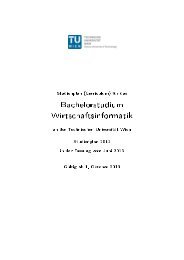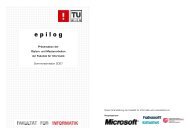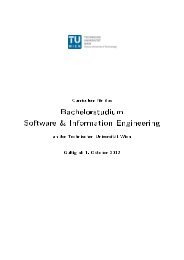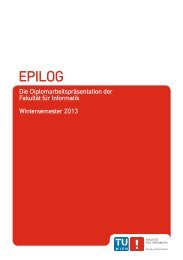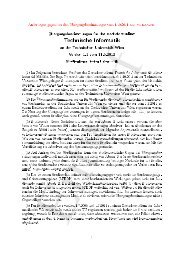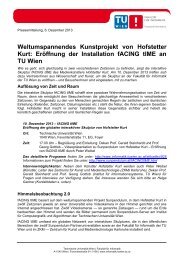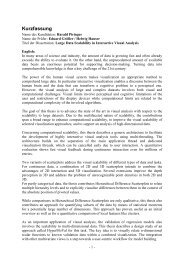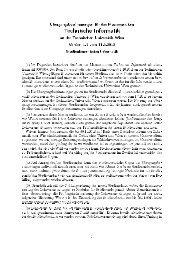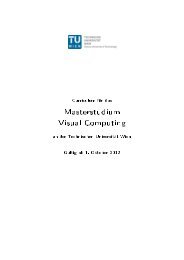Masterstudium Business Informatics - Fakultät für Informatik, TU Wien
Masterstudium Business Informatics - Fakultät für Informatik, TU Wien
Masterstudium Business Informatics - Fakultät für Informatik, TU Wien
Create successful ePaper yourself
Turn your PDF publications into a flip-book with our unique Google optimized e-Paper software.
• Engineering of distributed systems<br />
• Abstraction of dierent implementation technologies<br />
• Comparing and evaluating dierent implementation technologies, selecting the<br />
right tool for the right job<br />
Competences:<br />
• Self-organization and time-management<br />
• Team-organization, team-communication, conict resolution<br />
• Taking the responsibility for technical decisions<br />
• Process awareness and structured solution approaches<br />
• Critical reection, assessment, analysis, and reasoning of alternatives<br />
Syllabus: Object-relational mapping; distributed object middleware, such as Enterprize<br />
Java Beans; middleware services: transactions and security; message-oriented middleware;<br />
Web services; middleware conguration and metadata; presentation tier technologies<br />
Expected Prerequisites: Programming skills in Java and distributed systems; ability to<br />
build extensible software solutions, and understanding of what goes on `in the background'<br />
when programming middleware is used.<br />
INT/PRO - Programmkonstruktion, INT/SEN - Systems Engineering<br />
Teaching and Learning Methods and Adequate Assessment of Performance: The module<br />
is organized along reading lecture materials before each lecture, lectures, and lab<br />
assignments.<br />
Courses of Module:<br />
6.0/4.0 VU Distributed Systems Technologies<br />
SIT/DS3 - Networking<br />
ECTS-Credits: 6.0<br />
Summary: This module covers important topics of advanced networking, such as design,<br />
implementation, maintenance and management. Furthermore, issues of mobile and<br />
pervasive computing are covered and set in relation to the knowledge acquired in networking.<br />
This module aims at providing a lower-level view on the topics covered in the<br />
modules SPT/DS1 and SPT/DS2, but is fundamentally independent. The module consists<br />
of three parts. Advanced networking is covered in a lecture and a separate practical<br />
lab. The lecture is held in an interactive way, student contributions are expected and<br />
required. The lecture is graded using an oral exam. The lab is held as group work and<br />
71



